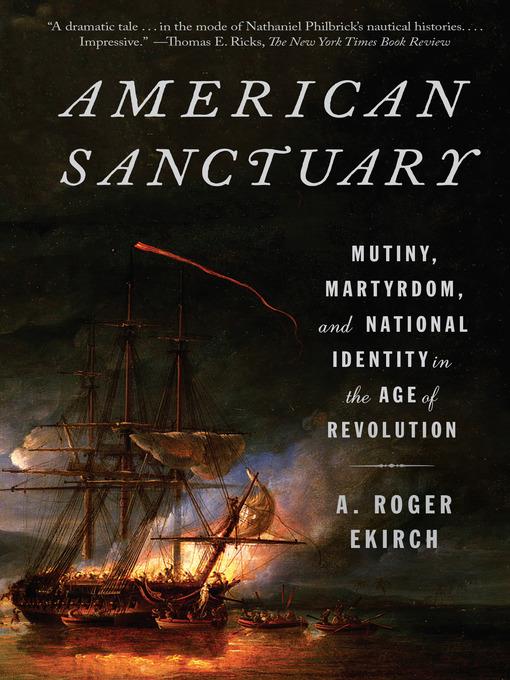
American Sanctuary
Mutiny, Martyrdom, and National Identity in the Age of Revolution
کتاب های مرتبط
- اطلاعات
- نقد و بررسی
- دیدگاه کاربران
نقد و بررسی

December 5, 2016
Ekirch (Birthright), professor of history at Virginia Tech, delves into the far-reaching ramifications of a violent 18th-century mutiny on the HMS Hermione, a British frigate. He persuasively argues that the fallout of the mutiny—specifically the extradition of Jonathan Robbins (aka Thomas Nash), a key mutineer, from the fledgling U.S. to Great Britain and his subsequent hanging—was pivotal in the bitterly fought battle for the American presidency between incumbent John Adams and challenger Thomas Jefferson. Ekirch also builds a strong case that the politics informing the controversy were instrumental in the historical refusal of the U.S. to extradite aliens charged solely with political crimes. Ekirch, a meticulous historian who writes with flair, brings the political theatre of the 1800 election into full view. He explains in detail how Jefferson’s Republican Party turned Robbins into a martyr and cause célèbre, which helped bring an end to the Adams administration. Modern readers will recognize several elements of the campaign to discredit Adams: a vitriolic press, high-profile Congressional hearings, and threats of censure. The story of how a mutiny on a British frigate became a major influence in U.S. politics and spawned bedrock U.S. policy is a complex and instructive tale.

Starred review from December 15, 2016
A historian revisits a little-remembered incident, the murderous 1797 mutiny aboard HMS Hermione, and traces its startling ramifications. Against the backdrop of revolutions worldwide, the Royal Navy vowed to hunt down the perpetrators of an "unprecedented barbarity." Apprehended in Charleston, South Carolina, Jonathan Robbins, a ringleader in Hermione's bloody business, was surrendered to the Royal Navy at the urging of Secretary of State Thomas Pickering, with the agreement of President John Adams and the grudging acquiescence of a federal judge. Subsequently hanged, Robbins became among the more unlikely martyrs in American history. A wedge issue avant la lettre, the extradition and execution of Robbins heightened the differences between the Republicans and Federalists in the 1800 presidential election, helped expose divisions within the Federalist Party itself, and perhaps accounted for Thomas Jefferson's razor-thin margin of victory. Was Robbins, as supporters claimed, a Connecticut native, conscripted aboard a marauding British frigate captained by a despot? Robbins struck a blow for liberty, Republicans insisted, and then was denied due process and a jury trial. Or was he, as Federalists argued, really Irish, a British subject whose monstrous crimes required his surrender under the terms of the pertinent, if highly controversial, Jay Treaty of 1795? Ekirch (History/Virginia Tech; Birthright: The True Story that Inspired Kidnapped, 2010, etc.) covers the mutiny in all its drunken, gory excess, tracks the worldwide hunt and capture of some of the perpetrators, and then offers a masterful dissection of the political consequences of the Robbins affair. The author is especially good on how the debate played out in the pages of the era's highly partisan press. Careful to remind us that other issues figured prominently and contributed mightily to the vitriolic 1800 campaign, Ekirch nevertheless persuasively argues that "the ghost of Robbins" likely tipped the balance in Pennsylvania and New York. The Robbins controversy featured arguments about alien rights, asylum, national identity, and the meaning and scope of American citizenship, all of which persist and all of which Ekirch handles with remarkable dexterity.
COPYRIGHT(2016) Kirkus Reviews, ALL RIGHTS RESERVED.

November 15, 2016
In 1797, eight years following the infamous mutiny on the HMS Bounty in the Pacific, a lesser-known revolt on the frigate HMS Hermione occurred in the Atlantic. It happened to be the bloodiest uprising ever suffered by the British Royal Navy. Ekirch (history, Virginia Tech; At Day's Close) does an admirable job bringing to light this unfamiliar history, using it as a vehicle to describe the early state of American politics in postrevolutionary times. After the rebellion, the British government sought extradition for one of the mutineers, Jonathan Robbins. In doing so, the government creating one of the first political controversies in American history. Though the mutiny is described in full detail, Ekrich is more interested in how the young American government handles its first major international controversy, introducing the major players involved: Alexander Hamilton, Thomas Jefferson, John Adams, and Aaron Burr, to name a few. VERDICT Intended for both history enthusiasts as well as casual readers, this book will especially appeal to fans of post-Colonial U.S. history; perhaps leaning to the more academic side. With this period getting a boost from the Broadway smash hit Hamilton, readers will be treated to a concise, unique moment in the nation's past that would have aftershocks for years to come.--Keith Klang, Port Washington P.L., NY
Copyright 2016 Library Journal, LLC Used with permission.

























دیدگاه کاربران